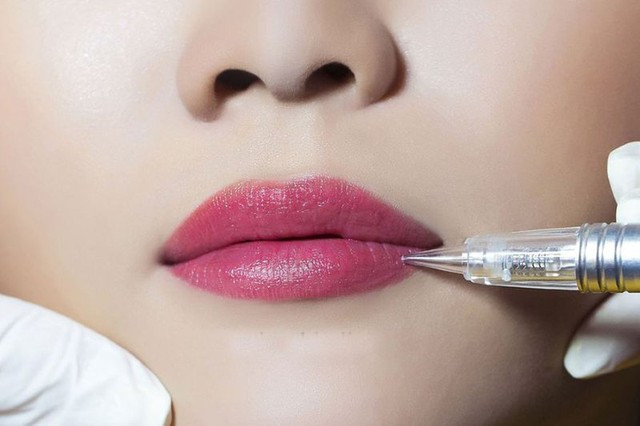Nowadays, tattooing eyes, eyebrows, and lips is a popular beauty method. However, if you go to unsafe beauty facilities, or "underground" facilities, be careful not to bring disaster upon yourself.

Tattooing at facilities lacking expertise and professionalism poses many potential health risks. Illustrative photo
Spraying and tattooing are essentially methods of using metal to inject a certain amount of coloring substance deep into the epidermis of the skin. Because small needles are used to directly penetrate the skin, lip spraying and tattooing still pose many potential health risks, especially if performed at unprofessional and unprofessional beauty salons.
Common diseases caused by unsafe tattooing
- Infection at the tattoo site: After getting a tattoo, your skin will be red and swollen. Your skin will feel sore and you may see clear fluid oozing from the tattoo. You may experience one or more of the following: Redness, persistent pain at the new tattoo site, rash, or ulcers on the tattoo.
Normally, if the swelling lasts for about 2-3 days, there is no need to worry too much because it will heal on its own, but if the tattoo is still swollen after 5-6 days, you need to see a doctor for advice and treatment.
- Allergic to tattoo ink, especially for customers with allergic and sensitive skin. The most susceptible areas are the lips and eyes. Allergies when spraying and tattooing lips are often manifested by skin inflammation, swelling, peeling that lasts for months, even years, affecting the aesthetics and psychology of the person getting the tattoo.
Symptoms of tattoo ink allergy include: redness, swelling, itching, raised bumps on the skin surface, possibly in patches, blisters, oozing, crusting... Black tattoo ink containing PPD often causes rashes right at the time of tattooing or about 3 weeks later. The skin is red, swollen, very itchy, painful, raised bumps and patches appear on the skin, the skin peels, blisters, oozing, discoloration, scarring...
- Transmission of infectious diseases: If not properly sterilized, the equipment and machinery used in the tattooing process can be the cause of transmission of dangerous diseases such as syphilis, HIV, hepatitis B, C... Not to mention the risks that may be encountered such as uneven lips and eyebrows, crooked lip lines, tattoo color changes that are not the same as the original ink color chosen before...
Doctor's advice
To get the tattoo as desired and safe for your health, you need to note:
You should choose a beauty facility with safe and hygienic conditions and a license.
All related tools such as ink pots, needles, needles, cotton, tray liners, anesthetics, machines, and razor blades must be cleaned and sterilized before use.
Avoid contact with allergens such as dust, animal hair, cosmetics, etc. to limit skin damage in the tattooed area.
If you have reactions after tattooing such as itching, redness, swelling or even difficulty breathing, chest tightness, dizziness, abdominal pain... you need to see a dermatologist for definitive treatment.
After getting a tattoo, you should avoid certain things that your body is allergic to.
You can use sunscreen and cover the tattooed area carefully before going out in the sun.
In cases of mild tattoo ink allergies that only cause itching, you can use an improvement solution by applying ice to the itchy skin area for about 15 minutes.
According to Health and Life